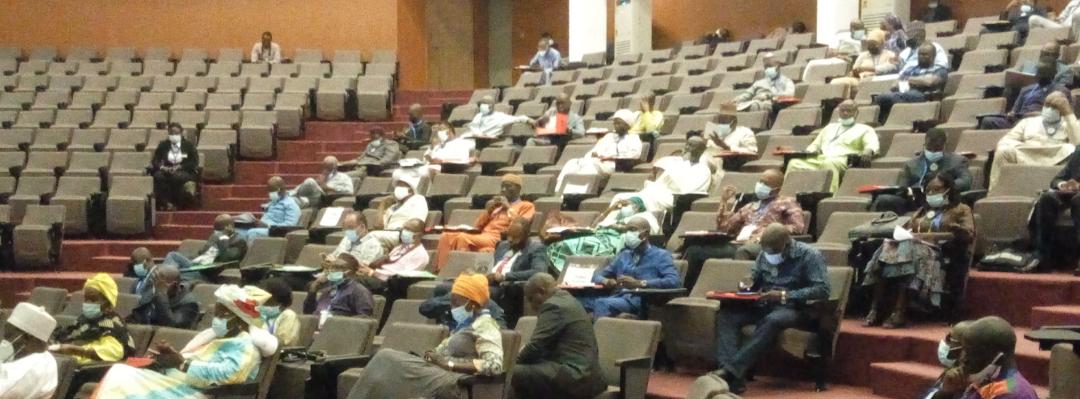Read More: Which Chief in Ghana has the largest collection of Kente Cloth?
It could be recalled that during the opening ceremony of the seminar, H.E. Hon. Sidi Mohamed Tunis, Speaker of the ECOWAS Parliament lamented the decline in the payment of Community Levy, by saying that: “Sadly, we are witnessing a low mobilization of the said resources which has been around 30% of forecasts over the past three years,” adding that import receipts on which the Community Levy is based have also dwindled due to the impact of the health crisis on the global economy.
“We are therefore entreated during our discussions, to define an intervention framework for parliamentarians in the strategy of mobilizing the said resources and to find the means to achieve the effective application of the ECOWAS Protocol, because, the Community Levy is the very expression of the solidarity and responsibility of our respective Governments in the process of integration and in the achievement of the regional agenda.”
In doing justice to the subject of discussion, M. Gueye Ibrahim, Facilitator, delivered a presentation on the sub-theme, “Methods of involving ECOWAS MPs in monitoring the implementation of the Protocol relating to the Community Levy.”
“MEPs must be involved in the rolling-out of the policies,” he said, citing other areas that could be meaningful to the Supplementary Treaty noting concerns on the need for close collaboration, monitoring, and evaluation.During the post-presentation deliberations, eight MEPs pointed out concerns on wide-ranging issues affecting the subject matter.
Hon. Clarence Massaquoi, Liberia, said his general impression from previous conferences held, problems are restated but with no definite actions to be followed.
He concluded that the MEPs powers should not only be limited to mere opinion on the Community budget adding that the Commission should come to the Parliament to defend its budget, not the other way round, ‘the powers of the Parliament must be enhanced. Our relations should be enforceable and not optional
Hon. Sado Nazaire, Benin, deposited that an efficient monitoring system should be put in place to levy the payments, noting that: “I will like to suggest that we have a focal point in each State. With the focal points, we can train and trace for people to understand what they are supposed to do and what they need to do completely. We must also define ways of motivating them. I will like to suggest that by way of getting the monies owed, the West African Monitoring Union, Central Banks debit automatically contributions that are to be paid. ECOWAS should help that the Central Bank levy the amount and we should contact countries such as Ghana and Nigeria. Proceeding in this way, we will start finding a few solutions to the problem and meeting the challenges.”
Hon. Ahi Sampson, Ghana, submitted that various Members States are allowed to make a collection of contributions.
“We must realize that there are challenges with the current system of collection. There is a need for us to review. Some Members States collects the levy, keep it throughout the year without paying to the Commission.
Allowing the Member States to collect levies on behalf of the Commission, If a Members States has a peculiar problem, certainly especially with regards to the balance of payment deficits, don’t forget those monies are translated in US dollars, if they have such situations they will rather use it to offset or to address their balance of payment deficit as against transferring same to the Commission, with that, I think we should look at changing the current model of collection to allow the Commission to have direct access to the collection points. The Parliament’s Committee for Finance and Budget should be strengthened to have oversight and meetings with the Members States and ensure that the Commission is not deprived of the necessary funds needed for conducting its operations.”
Aime Assina, Senegal, said the presentation was an eminent expert submission but noted he was a bit perplexed with the lack of interest of Members States to deliberate the organization’s means that will enable it to function normally. He said: “It goes without saying that when you establish an organization, you need accompanying measures and the main measure is providing it with financial means. I will like to find out concretely what the Finance Committee did, whether it intervened, visa a viz, states and what are the impediments that are making necessary for MPs to be asked to step in which is not a bad thing, we are going to step in, because we were appointed by our governments to play a role. I was really uncomfortable to note that Senegal, our Senegal owes twenty-nine billion or something like that. It is quite disturbing when you are sent as a delegate to an organization that you are not paying its fees, a State that is considered powerful is having such arrears. It is important that we really need to do something. We must together enhance the Finance Committee. It is a prerogative that we set up a standing committee that will liaise directly with the country’s Ministers of Finance.”
There were also inputs from, Hon. Magasi Mohamed, Gambia, Nabied Nimaye, Burkina Faso, Hon. Aglandao, Togo and Nassizou Halidou, Niger.
The seminar is expected to end on Thursday 25th March 2021 when the resolutions from the deliberations are expected to be punctuated for further action.

